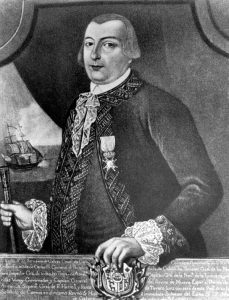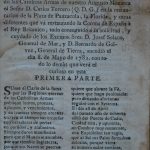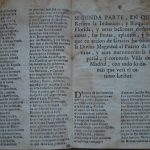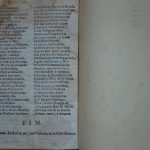
Portrait of Bernardo de Galvez (Courtesy, State Archives of Florida, Florida Memory)
Bernardo de Gálvez, Spanish governor of Louisiana and unsung hero of the American Revolution, was born on July 23, 1746, in Macharaviaya, Spain. Following in his father’s footsteps, Gálvez chose a military career that quickly found him colonel of the Louisiana Regiment after years helping Spain fight Portugal and Apaches in New Spain.
During the early stages of the American Revolution, Gálvez supplied patriots with arms and supplies, becoming an active ally. Once Juan Carlos III declared war on Great Britain in 1779, Gálvez, after direct communication with Patrick Henry and Thomas Jefferson, soon became a more enthusiastic participant, helping the patriots by securing the port of New Orleans and defeating the British at Mobile, Alabama and Natchez, Mississippi. One of the most important defeats against the British came after a two-month siege on the capital of West Florida, what is known today as, Pensacola. Great Britain’s defeat at the Battle of Pensacola eventually secured Spain’s control of East and West Florida in 1783 and ultimately ensured Gálvez’s reputation throughout parts of Europe and the Americas.
Gálvez’s poem, from a rare copy graciously provided by the Library of Congress, is translated into English for the first time by Jonathan Tharin as “The Triumphant Victory at Pensacola.” Gálvez creates a two-part ode glorifying the defeat of the British by his Spanish forces and the subsequent celebration of their victory. Upon returning to Spain, Gálvez was given a royal commendation, named governor of Florida, and eventually given the title of viceroy of New Spain after the death of his father. In honor of his role during the American Revolution, Congress finally fulfilled their promise made 232 years earlier by hanging his portrait in the Senate Foreign Relations Committee room in the Capitol.
Edited by Nicole Darbois
Translation by Jonathan Tharin
Further Reading
Baker, Maury and Margaret Bissler Haas. “Bernardo De Gálvez’s Combat Diary for the Battle of Pensacola.” Florida Historical Quarterly 56:2 (1977): 176-99.
Mitchell, Barbara. “America’s Spanish Savior: Bernardo De Galvez Marches to Rescue the Colonies.” MHQ 23:1 (2010): 98-104.
Washington, George. The Writings of George Washington. Ed. Jared Sparks. Harper, 1847.
Gálvez, Bernardo De. Recordado en Washington. Málaga: Biblioteca Virtual de la Provincia de Málaga, 1971.
Noteworthy, True, Triumphant, and Victorious Report that declares, and gives news of the happy victory, and victorious applause had by the Catholic Armies of our August Monarch the Lord Charles the Third (God Save Him) in the restoration of the Site of Pensacola, Florida, and other different lands that the Spanish Crown goes restoring from the British King, all obtained at the request and care of the Most Excellent Sirs Mr. Josef Solano, General of the Sea, and Mr. Bernardo Galvez, General of the Land as occurred the 8th day of May of 1781, with all else that will be seen curious in this First Part.
The Trumpet sounds of the fame
from the ethereal Regions
of the Catholic Armies
proclaiming laurels, feats,
praises, and victories, 5
and in engravings forever eternal
time inscribes their triumphs
with characters
of false alabaster pearls.
May the manifestations everlasting 10
remain to astound the world,
why England trembles,
because her Ships fall
before the Spanish Flag,
that she surrender her pride, 15
and punish her arrogance;
watching, a severe God
desires that she return to his Church,
desires that she embrace the Faith,
desires that she do penance: 20
but leaving aphorism
I will follow the System.
On the 28th day of April
of the past year of [seventeen]eighty,
out of the Port of Cadiz, 25
a City rich, and opulent,
departed a Convoy of very large number,
an Expedition so regal,
that the Sun formed lattices
of the masts, because it was as if 30
their number was seen between curtains,
between Clouds and Flags;
The Sea almost became,
with so many Vessels in its Arena,
a new world populated 35
with very diverse Cities;
favorable was the west wind
that blowing the route
upon the waters it appeared as if
each Ship an Arrow, 40
each Frigate a Falcon,
each Vessel a Dart,
that being flying sirens,
they were Eagles with Sails;
but luck changed, 45
as the Air its path changed,
the wind all of its course
to the contrary route,
had the effect that time
prolonged our plan: 50
but God evenso sent
this contrary weakness,
in order to test Spain’s
invincible fortitude,
that Spain would not lose heart 55
in good or bad fortune.
So it was very constant,
when the task came,
that in his military fatigue
each Spaniard shone, 60
beacons of bravery, courage,
as dictated by experience,
when the time to achieve,
when the time permits
the Royal Order of the mandate, 65
and to Pensacola directs the conserved apparatus
of this maritime force,
with a very favorable wind
to its immediate arrival,
and on the eighth day of May 70
of the year of [seventeen]eighty one
without any precautions,
nor other prolonged vicissitudes,
they set sail for their Bay;
up against the defenses 75
they were prevented in vain,
it was on this occasion so beautiful
that ten Merchant Ships were captured,
and two War Frigates;
and at once the Spaniards 80
loosing their Troops upon the shore,
like iron Lions
that desired this discord.
They corralled the Enemy
in the Hills, and the Jungles, 85
by sea and land they amazed
the chimera of Pensacola,
as the Warships beat back
its greater forces:
At the entrance of their Port, 90
two Castles were conserved
which beat back the first ones,
and to the earth they struck down
their Walls and Cannons
with magnanimous ferocity. 95
Many were the dispossesions,
effects, fruits, riches,
that were acquired by our Spain
in this bloody invasion.
Long live the power that governs, 100
the Leaders that govern it,
long live the Spanish Lion,
long live the Fleur-de-lis,
and let die the heresy
in its rebellious ineptitude. 105
Surrender yourself English to the faith,
watch how the adverse luck
is against you, and that the ire
of the Sum of All Omnipotence
is enraged against you. 110
And here discrete Audience
this first part
gives an end to my rough speech
so that another part may complete
what is missing from the first. 115
Second Part, relating the Invasion and Blockade of Florida, and other curious warlike news: the festivals, ovations, and celebrations that in Thanksgiving have been offered to the Divine Majesty of the Port of Havana, and again now the Imperial, and crowned Town of Madrid, with all the rest that will be seen by the curious Reader.
After the laurel crowns
and the warlike laurels
that the noble Spaniards
in Pensacola won,
to the Island of Florida 120
bravery has brought them,
as it is her parallel,
and is on her side,
and immediate situation;
the cannonball has opened free passage 125
to their entrance, so their Leaders,
payed homage the spoils
to Castilla, and Leon,
even though they fought well
they offered tribute 130
to our undefeated King Charles.
The rival Prisoners,
according to the written notes of the Charters,
are five thousand, and among them
three gallant Generals, 135
one hundred and twenty Captains,
and other noble Soldiers
of consequence, so that
in this Spain has won
from the English three hundred Leagues, 140
whose spacious lands
in their fruits and harvests,
according to what is stated
gave fourteen Million
in Incomes ever year; 145
it has remained lacking
in the official documentation
for no Englishman consents
to trade, nor treaty.
The General has mandated 150
to settle all that has been gained
in Weaponry, and bringing Troops
from Havana, and its population
of Provential Militias,
and of the rival’s spoils 155
that furnish the Island
he has set in place like a Boulder,
stronger than ever
for defense, and protection
of the Gospel, watchtower 160
against its damned opponents.
This train arrives from Havana,
the one that Morro Castle has saluted
with all its Artillery,
acclaiming the song of the King 165
and the Law before all,
the Ships were dressed,
their Flags made up
Gardens, Flowers, and Forests,
so the same Spring 170
in the Vessels has stayed itself,
there the night became day,
so even though the Sun went away
the fireworks
created generous Suns. 175
To the great God of Battles
the Te Deum laudamus was sung
and in our Court of Spain
when these new ones arrived,
with the same ceremonies 180
to God performing burnt offerings
giving the proper worship
for such victorious laurels
attending to the Magnificence
of such a Religious Act. 185
Up to this point notifies
my meager muse has slowly
managed to lyricise
her declared news,
also I declare that 190
the great Don Josef Solano lives,
that he alone in this invasion
has stode with Galvez the Gallant;
English, convert to God
your tarnished pride, 195
giving up that which is not yours,
agreeing to treaties,
see that Spain triumphs
having God on her side.
Long live the Faith that adorns her, 200
long live the zeal, the care,
long live her beloved Patron
the Immaculate Star
of the Pure Conception,
and the Apostle Saint James. 205
Long live, long live the Gospel,
long live our King Charles
that his Reign be
defended, protected, and true.
The End.
With permission: In Sevilla, by Josef Padrino, on Genova Street.



